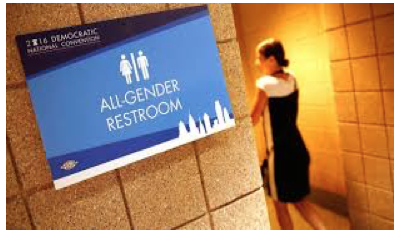CommentsTHE TIMES THEY ARE A CHANGIN’--You've probably seen one of the many gender-neutral bathroom signs that have popped up over the past couple of years. On the face of it, the message they convey is simple: Anyone can use this facility.
But in fact, they say a lot more than that.
"Gender-inclusive bathrooms serve a practical function of providing a safe public restroom for transgender individuals," write Rutgers University psychologists Kimberly Chaney and Diana Sanchez. But they also signal "a broader ideology of equality," including a positive, non-discriminatory environment for women and racial minorities.
To put it simply: People assume that if an organization is sensitive and caring enough to accommodate members of the transgender community, it's probably fair to everyone.
In the journal Social Psychological and Personality Science, the researchers demonstrate this dynamic in a series of studies. The first featured 170 undergraduates who took a survey "ostensibly examining how people evaluate financial companies."
The presentation included digital mock-ups of such a firm's office building. Near the front desk, there was a bathroom sign that was either labeled "all-gender restroom" (with a non-binary gender image) or simply "restroom" (with a binary gender image).
After viewing it, the students rated the company for how fairly it treats its female employees, such as the likelihood it offers paid maternity leave.
 "Participants perceived the gender-inclusive bathroom company as more female-friendly," the researchers report. "Women reported less anticipated gender stigma, and greater procedural fairness for women."
"Participants perceived the gender-inclusive bathroom company as more female-friendly," the researchers report. "Women reported less anticipated gender stigma, and greater procedural fairness for women."
Another study, featuring 133 undergraduates, used the same structure, but measured perceived racial bias. It found "a gender-inclusive bathroom signaled greater identity safety for racial minorities," due to a perceived high rate of fairness and low rate of stigma.
"Importantly, gender-inclusive bathrooms did not appear to threaten people," the researchers add, "as participants reported greater or equal comfort compared to traditional bathrooms."
These findings provide evidence that, on a basic level, people understand "the overlapping nature of essentialist ideologies," the researchers write. Discomfort with transgender individuals signals a rigid attitude regarding gender, and the belief that women and men have intrinsic differences beyond reproductive biology.
At least among college students, there seems to be an assumption that people with that mindset are more likely to devalue women in the workplace, and hold prejudices against members of other races or ethnicities. Thus gender-neutral bathrooms signal equal treatment for all.
Not bad for a little blue sign.
(Tom Jacobs is a staff writer with Pacific Standard magazine … where this piece was first posted.)
-cw















